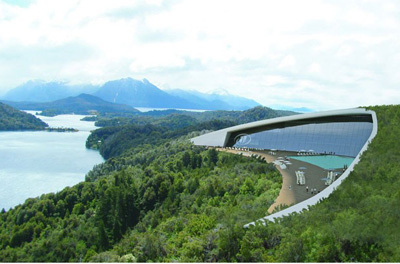«Green hotels» are an obvious trend of the recent years
The concept of steady growth has become one of the key factors influencing economic growth in the past few decades. Stable growth itself is a global and a complex process with a lot of components — social, economic, ecological. Hotels try to keep up with the times, introduce elements of «green business» into their development plans, the business all aspects of which imply ecologically friendly activities.

The Hilton hotel chain is going to construct an eco-friendly hotel at Bariloche, the world famous Agrentine resort; it will be «built into» one of the hills on the lake shore.
What do hotels need it for?
It is no secret that introduction of green technologies is costly, so Russian hotels have lagged behind western and even eastern ones, whose business lexicon has long included the words «stable» and «green». But apart from the pure economic factor there are some more arguments for switching to green technologies:
1) Strange as it may seem, reasonable economic policy in hotels will lead to cost saving in the end. For example, if you introduce more expensive energy saving lamps at first, you will be able to reduce energy costs by 20-40% some time later. In the beginning of 2000 low pressure mixers and shower aerators were installed in Holiday Inn in Toronto, which helped save about 15 thousand Canadian dollars (about 13,5 thousand US dollars).
We can think of a lot of ways to save energy — the use of waterless toilets, economical dishwashing liquids, luminous and energy saving lamps, motion detectors that turn on the light only when there is someone in the room. Many hotels offer their guests an opportunity to choose themselves when to change towels — it can help save on washing powders considerably and, consequently, cut costs.
2) Competitive advantages. Ecological certificates and other documents proving conformance to Russian and world standards are a great marketing aid, which is obvious — when the traveller chooses between two approximately similar variants he will not risk and prefer a more reliable hotel.

More than 2300 companies from Great Britain, Ireland and Canada have joined The Green Tourism program. One of the most important aspects of Green Tourism activity is promotion of «green» business travel.
3) Ecological programs are an efficient way of increasing motivation of employees. Many companies add to salaries the money they have saved as the result of introduction of ecological strategy. If an employee knows that he will probably be encouraged as the result of successful implementation of a program (the «green» program in this case), he will try to do his best to fulfill his part of the program to achieve the aim.
4) Customer loyalty. For the past quarter of the century travellers’ requirements have changed, many of them have started paying attention to the way the hotel solves ecological issues. If guests learn that disposed bottles, tins and paper are recycled, and not taken to a dump site, if they know that organic (and not genetically modified) food is served in the restaurant, and a bus on ecological fuel is used for transfers, all this will definitely add points to this hotel in his personal hotel rating.
Nevertheless, many guests choose a hotel depending on its location, convenience and service, and business travellers consider hotel facilities very important. Ecological initiatives will play a minor role in this case, but they can be an additional advantage.
5) One of the most important arguments for stable growth programs is conformability to legislative requirements. If now companies carry out programs of this kind on a free-will basis, at some moment requirements may become stricter and then those hotels that have already started ecological programs may benefit. Others risk losing their opportunity to offer accommodation at all.
Besides, it should be noted that some insurance companies and creditors start correcting their rates depending on ecological criteria and programs stated by hotels.
6) Minimization of risks. Risk management strategy in hotels has traditionally been focused on safety and health protection — quality control of food and water, pest control, fire safety, protection against natural disasters, disease prevention and safety of guests. Now ecological measures may be added to this list:
— reduction of water and soil contamination;
— reduction of exhausts into the atmosphere, noise pollution decrease;
— hotel’s engagement in environmental activities
— introduction of a reasonable waste policy.
On the one hand, we can say that hotels and resorts do not have to fulfill part of these measures, they are the task of the state. They are obviously obligatory on the national, federal level. But if a five star hotel, for example, which is situated at the seaside, does not look after the nearest beach itself (and these beaches belong to hotels in most cases), it will soon have no guests at all.
And we are speaking not only about the nearest territories. Thus, Marriott has allocated 2 million dollars to the Amazonas Sustainable Foundation for its forest protection programs. Many large hotel chains purchase equipment, food for their restaurants etc only if suppliers have the necessary ecological certificates.

Many business travellers consider changing towels twice a day wasteful. Hoteliers meet their demands and let them choose the frequency of towel replacement themselves.
What do TMCs need it for?
In the middle of 2000 TMCs did not regard ecological factors as foreground and paid more attention to traditional MICE components in hotels or congress centres.
Irina Bosshard, independent travel and hotel consultant, stresses that nowadays corporate buyers definitely prefer hotels actively implementing stable growth programs. The largest hotel chains, such as Marriott or Radisson, do not imagine their business without following ecological strategies. Ms Bosshard stressed that this trend would only strengthen, and in the Russian market as well, although the latter has not yet achieved the western level, it has made great progress for the past few years.
In other words, the opposite process is under way: leading hoteliers introduce more and more «green» technologies and programs, and business travellers tell TMCs more and more often about the importance of ecological criteria when choosing a hotel. In this case it is important for a business travel agency to be acquainted with the policy of a certain hotel. In the USA and some other countries «green» hotels join specialized associations and the search process may be simplified considerably — you only need to check whether the hotel is the member of such an association and whether it has special ecological certificates proving its conformance to ecological standards. As a rule, hotels do not keep quiet, to put it mildly, about having certificates like that and place corresponding signs on the fore of their official sites.
Business is a rather cruel thing. But we can definitely say that hotels implement their ecological programs not only for the sake of «the common good» and the decrease of the carbon footprint that is not visible to anyone, but because all this really helps save money. Let’s hope that this trend will continue in the future.
Oleg Abarnikov